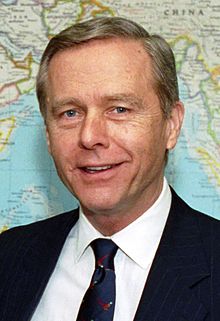
Back بيت ويلسون Arabic بيت ويلسون ARZ پیت ویلسون AZB Pete Wilson Catalan Pete Wilson German Pete Wilson Spanish پیت ویلسون Persian Pete Wilson Finnish Pete Wilson French פיט וילסון HE
Pete Wilson | |
|---|---|
 Wilson in 1993 | |
| 36th Governor of California | |
| In office January 7, 1991 – January 4, 1999 | |
| Lieutenant |
|
| Preceded by | George Deukmejian |
| Succeeded by | Gray Davis |
| United States Senator from California | |
| In office January 3, 1983 – January 7, 1991 | |
| Preceded by | S. I. Hayakawa |
| Succeeded by | John Seymour |
| 29th Mayor of San Diego | |
| In office December 6, 1971 – January 3, 1983 | |
| Preceded by | Francis Earl Curran |
| Succeeded by | Roger Hedgecock |
| Member of the California State Assembly from the 76th district | |
| In office January 2, 1967 – December 5, 1971 | |
| Preceded by | Clair Burgener |
| Succeeded by | Bob Wilson |
| Personal details | |
| Born | Peter Barton Wilson August 23, 1933 Lake Forest, Illinois, U.S. |
| Political party | Republican |
| Spouses |
|
| Education | Yale University (BA) University of California, Berkeley (JD) |
| Signature | |
| Military service | |
| Branch/service | United States Marine Corps |
| Years of service | 1955–1958 |
| Rank | First lieutenant |
| Unit | 1st Marine Division |
Peter Barton Wilson (born August 23, 1933) is an American attorney and politician who served as a United States senator from California from 1983 to 1991 and as the 36th governor of California from 1991 to 1999. A member of the Republican Party, he also served as the 29th mayor of San Diego from 1971 to 1983.
Born in Lake Forest, Illinois, Wilson graduated from the UC Berkeley School of Law after serving in the United States Marine Corps. He established a legal practice in San Diego and campaigned for Republicans such as Richard Nixon and Barry Goldwater. Wilson won election to the California State Assembly in 1966 and became the mayor of San Diego in 1971. He held that office until 1983, when he became a member of the United States Senate. In 1982, he defeated then-incumbent Governor Jerry Brown to become the United States senator from California. In the Senate, Wilson supported the Strategic Defense Initiative and the Civil Liberties Act of 1988, while he opposed the Omnibus Budget Reconciliation Act of 1990.
Wilson resigned from the Senate after winning the 1990 California gubernatorial election. As governor, Wilson signed a three-strikes law and supported energy deregulation and term limits. He was also an advocate for California Proposition 187, which established a state-run citizenship screening system with the intention of preventing illegal immigrants from using social services. Wilson won reelection in the 1994 gubernatorial election. He sought the Republican nomination in the 1996 United States presidential election but dropped out of the race before the primaries began.
Wilson retired from public office after serving two terms as governor. Since leaving office, he has worked for several businesses and has been affiliated with several other organizations. He is a distinguished visiting fellow at the Hoover Institution. As of to date, Wilson's 1988 re-election is the last time Republicans won a Senate election in California.